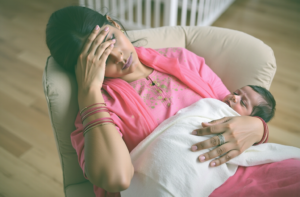“Why Don’t I Feel Like Myself Anymore?”
Having a baby is life-changing—but no one prepares you for the emotional rollercoaster that follows.
“I love my baby, so why do I feel so anxious?”
“I should be happy, but I feel exhausted and disconnected.”
“Will I ever feel like myself again?”
If these thoughts sound familiar, you’re not alone. The drastic hormonal shifts after childbirth affect your mood, energy, and emotions in ways that can be overwhelming. Understanding these changes can help you regain control and feel more like yourself again.
1. The Science Behind Postpartum Hormones
Your body goes through a major hormonal reset after giving birth, and that’s why you might feel emotionally and physically drained.
What’s happening inside your body?
- Estrogen & Progesterone Drop: These hormones plummet after birth, leading to mood swings and fatigue.
- Oxytocin Surge: This “love hormone” helps with bonding but can also make emotions feel more intense.
- Cortisol Spikes: Stress hormones may rise, increasing feelings of anxiety.
- Thyroid Fluctuations: Many moms experience postpartum thyroid imbalance, causing fatigue, mood swings, or even weight changes.
2. Signs Your Hormones Might Be Out of Balance
It’s normal to have ups and downs after birth, but sometimes hormonal imbalances can make recovery harder than it should be.
Symptoms to look out for:
- Feeling constantly sad, anxious, or overwhelmed.
- Extreme exhaustion, even after getting some rest.
- Trouble sleeping, even when the baby is asleep.
- Lack of interest in things you used to enjoy.
- Brain fog or difficulty concentrating.
- Hair loss, brittle nails, or sudden weight changes.
When to seek help: If your symptoms persist for more than two weeks, it might be more than just baby blues. Postpartum depression or thyroid imbalance could be at play—and they’re treatable!
3. How to Balance Your Hormones & Feel Like Yourself Again
The good news? There are simple ways to support your hormonal health and feel better.
Prioritize Rest & Sleep:
- Even short naps can help regulate stress hormones.
- Ask for help—your well-being matters too!
- Try relaxation techniques like meditation or deep breathing.
Eat for Hormonal Balance:
- Include foods rich in healthy fats, protein, and fiber to stabilize blood sugar.
- Iron & Vitamin D deficiencies are common—check your levels!
- Hydration is key—drink plenty of water to support your body.
Gentle Movement & Self-Care:
- Short walks or light stretching can improve mood.
- Sunlight helps boost serotonin (your happiness hormone).
- Practice self-kindness—your body is healing!
4. When to Seek Professional Help
If you feel like something isn’t right, trust your instincts. Seeking help is a sign of strength, not weakness.
Signs you should talk to a doctor:
- Persistent sadness, anxiety, or mood swings.
- Feeling disconnected from your baby.
- Physical symptoms like extreme fatigue or unexplained weight changes.
- Intrusive thoughts or feelings of hopelessness.
Final Thoughts: You Are Not Alone
Feeling “not yourself” after childbirth is more common than you think—but it doesn’t have to last forever. With the right support, nutrition, and self-care, you can reclaim your sense of self and enjoy motherhood on your terms.
Need expert guidance? Contact Paloma Care for personalized postpartum support designed for Indian moms like you.



